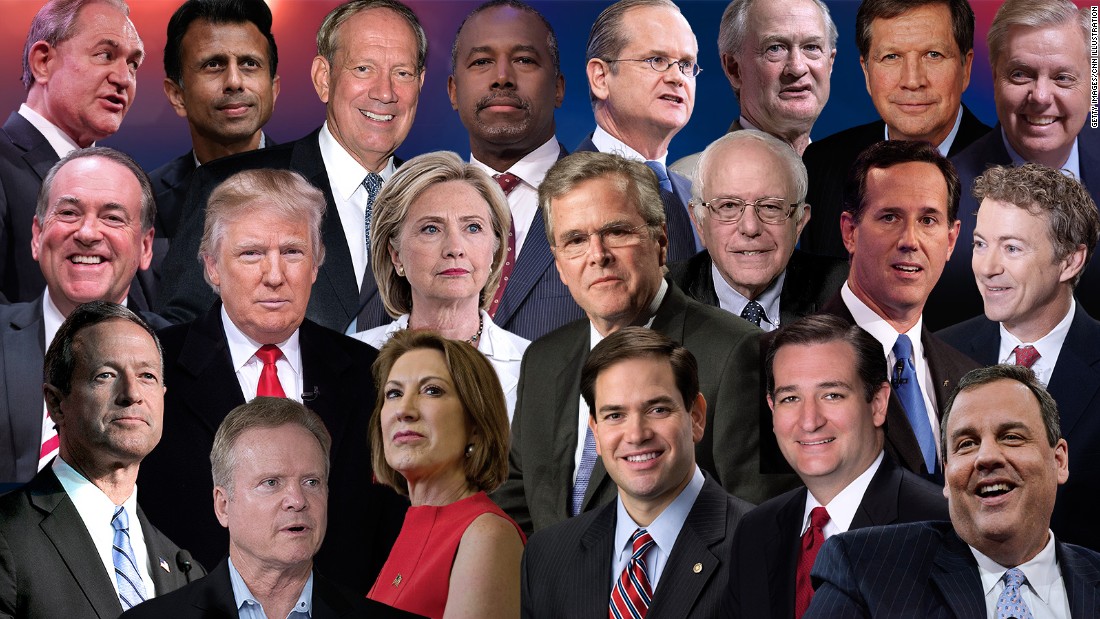[caption id="" align="alignnone" width="441"] Courtesy of cnn.com[/caption]
According to their websites and campaign statements, candidates for the 2016 presidential election are taking on the issue of student loans with a variety of proposals. Here is a summary of some their platforms on education:
Hillary Clinton: Democratic front-runner Hillary Clinton has proposed what she calls the New College Compact. The plan consists of distributing grants to states that fund public colleges and have students graduate debtfree. Grants would also be given to both public and private universities that enroll low income students.
The New Compact would additionally aid student debtors by cutting interest rates and refinancing loans. Community college under Clinton’s plan would be completely free. States can only earn funding from her $350 billion plan by ensuring free community college and no loans to students enrolled in public college.
Bernie Sanders: Democratic candidate Bernie Sanders has proposed a plan for free higher education. The senator’s College for All Act looks to eliminate public tuition by having the federal government fund two thirds of college tuition costs, and state governments funding one third.
Students and graduates currently paying off loans would additionally see their interest rates lowered. This plan would be funded by taxing Wall Street in what Sanders has dubbed the “Robin Hood tax.” Private schools such as Seton Hall would not receive funding for tuition-free education under this plan.
Martin O’Malley: Democratic candidate Martin O’Malley is also pushing for debt-free college. O’Malley has proposed having tuition for public universities lowered to match the median income of individuals in a state.
His plan also calls for increased state funding, a decrease in interest rates, and allowing students to refinance their loans at lower rates. He also advocates the expansion of Pell and federal grants to cover costs outside of tuition.
Republican frontrunner Donald Trump and candidate Ben Carson have made no official policy statements regarding higher education or tuition costs.
Ted Cruz: Sen. Ted Cruz is against affirmative action, saying that colleges should not focus on race but only academic merit when considering acceptance and financial aid. Cruz also says that financial aid should come from the states, not the federal government. Despite going over $100,000 in debt from law school, Cruz additionally voted against a bill that would allow students to refinance their loans.
Marco Rubio: Republican candidate Sen. Marco Rubio aims at making college tuition more affordable with the possibility of students graduating debt-free. He has proposed an income-based
loan payment plan that allows lower income students to repay their loans at slower rates. He also proposed allowing investors to cover a student’s tuition in return for a percentage of future income.
Chris Christie: In response to Sen. Bernie Sander’s proposal to eliminate tuition, Republican candidate Gov. Chris Christie said that free college is not the answer.
“If college graduates are going to reap the greater economic rewards and opportunities of earning a degree, then it seems fair for them to support the cost of the education they’re receiving,” Christie said during a speech at Iowa State University in June, as reported in U.S. News.
However, the New Jersey governor has expressed interest in expanding federal financial programs. He also advocates Rubio’s plan to have investors pay for student tuition.
Student Sarah Auerbach, freshman communications major, sides with Sanders on the issue.
“Bernie Sanders seems to have the most solid plan. I agree with both him and Hillary but his plan to tax Wall Street and split funding seems to be the best idea,” Auerbach said. “For the future, I think it makes sense for community college to be free. It’s only 2 years and it’s a good place for someone to start.”
Noelle Sorich, freshman diplomacy major, supports Rubio’s student investment plan.
“I don’t think anyone is going to go to college debt-free anytime soon,” Noelle said. “I think it makes more sense to privatize loans rather than to raise taxes and have us pay more in the long run.”
Maria Sweeney, freshman diplomacy major, agrees with Clinton’s debt-free tuition plan.
“Although it probably won’t count for us because we’re private, I like the incentive idea with the state grants. I think giving the states an incentive to help us would work better than just getting rid of tuition.”
Hunter DeSimone can be reached at hunter.desimone@student.shu.edu.
Courtesy of cnn.com[/caption]
According to their websites and campaign statements, candidates for the 2016 presidential election are taking on the issue of student loans with a variety of proposals. Here is a summary of some their platforms on education:
Hillary Clinton: Democratic front-runner Hillary Clinton has proposed what she calls the New College Compact. The plan consists of distributing grants to states that fund public colleges and have students graduate debtfree. Grants would also be given to both public and private universities that enroll low income students.
The New Compact would additionally aid student debtors by cutting interest rates and refinancing loans. Community college under Clinton’s plan would be completely free. States can only earn funding from her $350 billion plan by ensuring free community college and no loans to students enrolled in public college.
Bernie Sanders: Democratic candidate Bernie Sanders has proposed a plan for free higher education. The senator’s College for All Act looks to eliminate public tuition by having the federal government fund two thirds of college tuition costs, and state governments funding one third.
Students and graduates currently paying off loans would additionally see their interest rates lowered. This plan would be funded by taxing Wall Street in what Sanders has dubbed the “Robin Hood tax.” Private schools such as Seton Hall would not receive funding for tuition-free education under this plan.
Martin O’Malley: Democratic candidate Martin O’Malley is also pushing for debt-free college. O’Malley has proposed having tuition for public universities lowered to match the median income of individuals in a state.
His plan also calls for increased state funding, a decrease in interest rates, and allowing students to refinance their loans at lower rates. He also advocates the expansion of Pell and federal grants to cover costs outside of tuition.
Republican frontrunner Donald Trump and candidate Ben Carson have made no official policy statements regarding higher education or tuition costs.
Ted Cruz: Sen. Ted Cruz is against affirmative action, saying that colleges should not focus on race but only academic merit when considering acceptance and financial aid. Cruz also says that financial aid should come from the states, not the federal government. Despite going over $100,000 in debt from law school, Cruz additionally voted against a bill that would allow students to refinance their loans.
Marco Rubio: Republican candidate Sen. Marco Rubio aims at making college tuition more affordable with the possibility of students graduating debt-free. He has proposed an income-based
loan payment plan that allows lower income students to repay their loans at slower rates. He also proposed allowing investors to cover a student’s tuition in return for a percentage of future income.
Chris Christie: In response to Sen. Bernie Sander’s proposal to eliminate tuition, Republican candidate Gov. Chris Christie said that free college is not the answer.
“If college graduates are going to reap the greater economic rewards and opportunities of earning a degree, then it seems fair for them to support the cost of the education they’re receiving,” Christie said during a speech at Iowa State University in June, as reported in U.S. News.
However, the New Jersey governor has expressed interest in expanding federal financial programs. He also advocates Rubio’s plan to have investors pay for student tuition.
Student Sarah Auerbach, freshman communications major, sides with Sanders on the issue.
“Bernie Sanders seems to have the most solid plan. I agree with both him and Hillary but his plan to tax Wall Street and split funding seems to be the best idea,” Auerbach said. “For the future, I think it makes sense for community college to be free. It’s only 2 years and it’s a good place for someone to start.”
Noelle Sorich, freshman diplomacy major, supports Rubio’s student investment plan.
“I don’t think anyone is going to go to college debt-free anytime soon,” Noelle said. “I think it makes more sense to privatize loans rather than to raise taxes and have us pay more in the long run.”
Maria Sweeney, freshman diplomacy major, agrees with Clinton’s debt-free tuition plan.
“Although it probably won’t count for us because we’re private, I like the incentive idea with the state grants. I think giving the states an incentive to help us would work better than just getting rid of tuition.”
Hunter DeSimone can be reached at hunter.desimone@student.shu.edu.

Comments




